-
4
Threads -
6 GB
ECC Reg RAM -
2 TB
HDD Storage - 1 GBit/s connection
- Traffic included (fair use)
- Daily backup
Linux Storage vServer / VPS
Perfect for your own Nextcloud / Owncloud / Seafile instance!
- ✓Lots of storage for little money!
- ✓KVM virtualization
- ✓fast availability
- ✓data center location Frankfurt am Main
Products
-
8
Threads -
12 GB
ECC Reg RAM -
4 TB
HDD Storage - 1 GBit/s connection
- Traffic included (fair use)
- Daily backup
-
12
Threads -
24 GB
ECC Reg RAM -
8 TB
HDD Storage - 1 GBit/s connection
- Traffic included (fair use)
- Daily backup
-
16
Threads -
48 GB
ECC Reg RAM -
16 TB
HDD Storage - 1 GBit/s connection
- Traffic included (fair use)
- Daily backup
Can't find the right package? Our Linux vServer overview will help you quickly find the right offer. For enterprise solutions, take a look at our Compute vServer or our highly available Ceph HA vServer. If you need even more performance, our dedicated servers may be just right for you. If you have any special requirements or questions, our support team will be happy to help!
Key Points at a Glance
Special features of Linux Storage vServer
Our Linux Storage vServers have a very large ZFS-based storage space. A ZFS RAID 10 is used, which enables reliable HDD-based data storage even with large amounts of data. When selecting the hard disks, we rely on enterprise hard disks from various manufacturers, as normal storage hard disks are usually too slow for use in a vServer environment.
Each Linux storage vServer node is redundantly connected to the network and power within our data center environment in Frankfurt to realize maximum availability on the hardware side.
We provide common Linux operating systems to our vServer customers via 1-click installation. An installation of the Linux vServer using an own ISO is also possible.
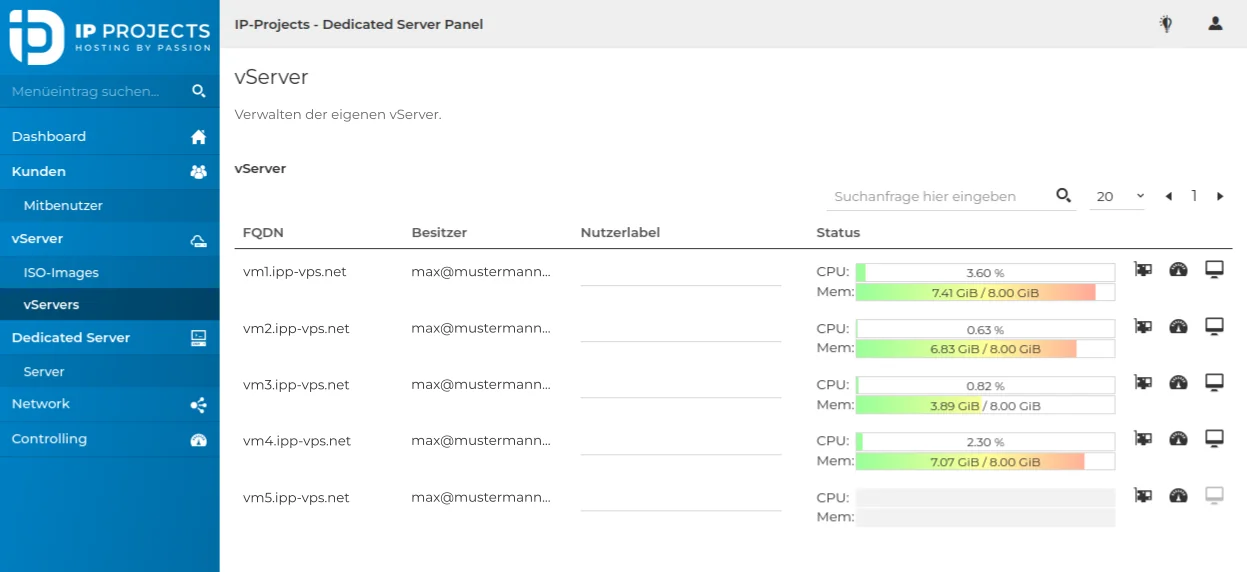
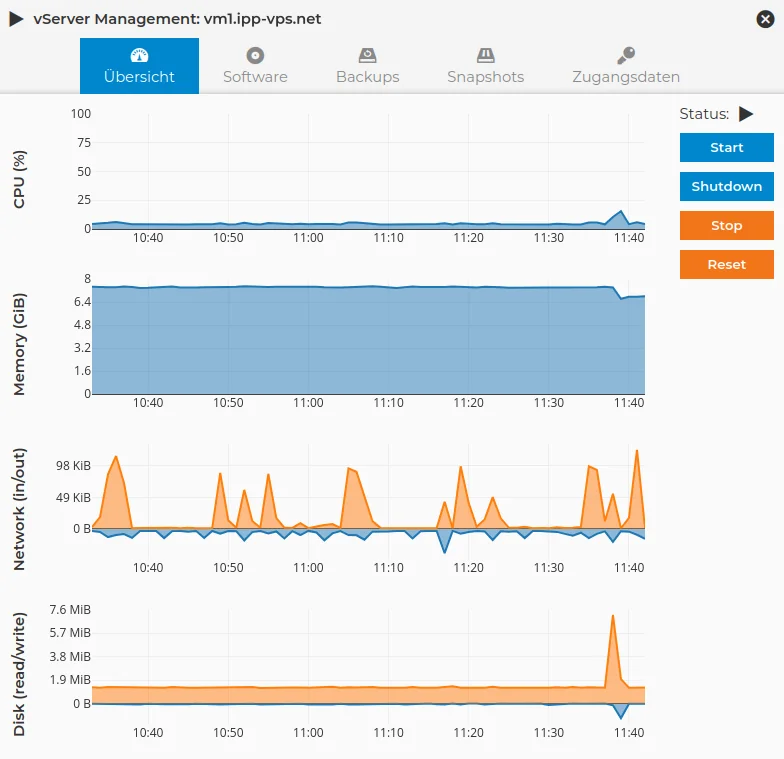

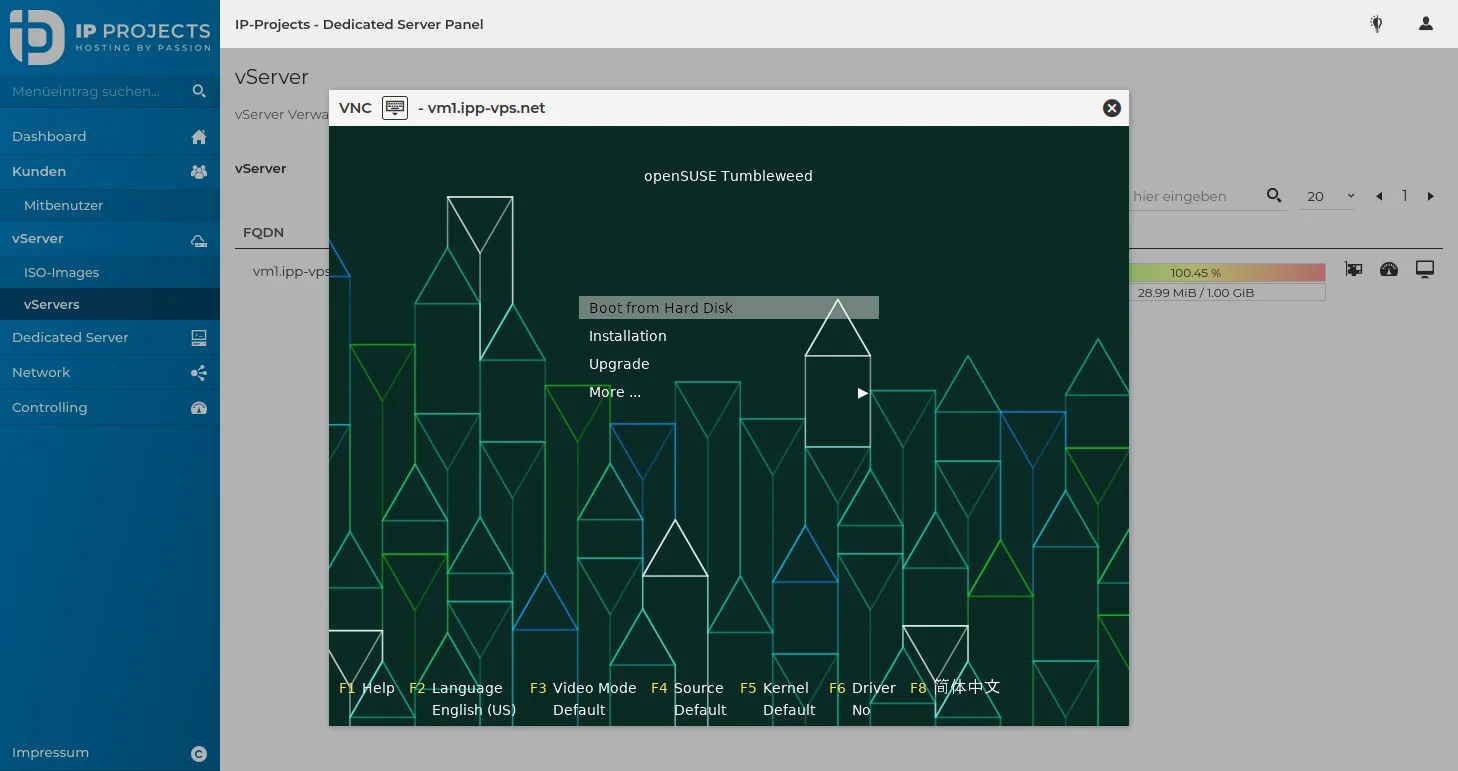
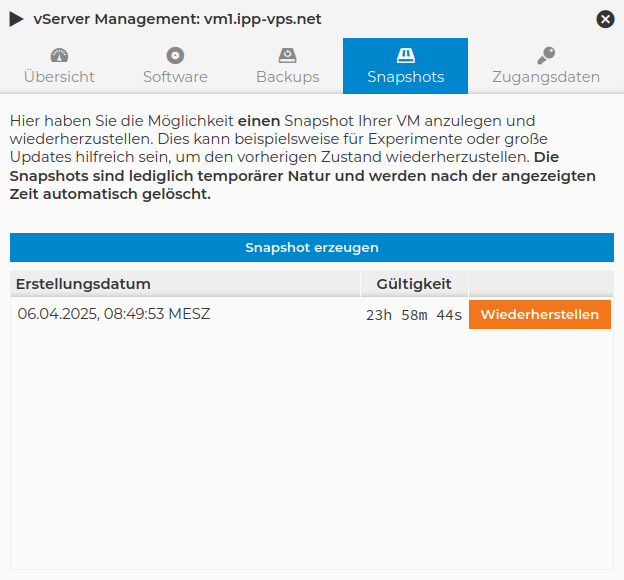
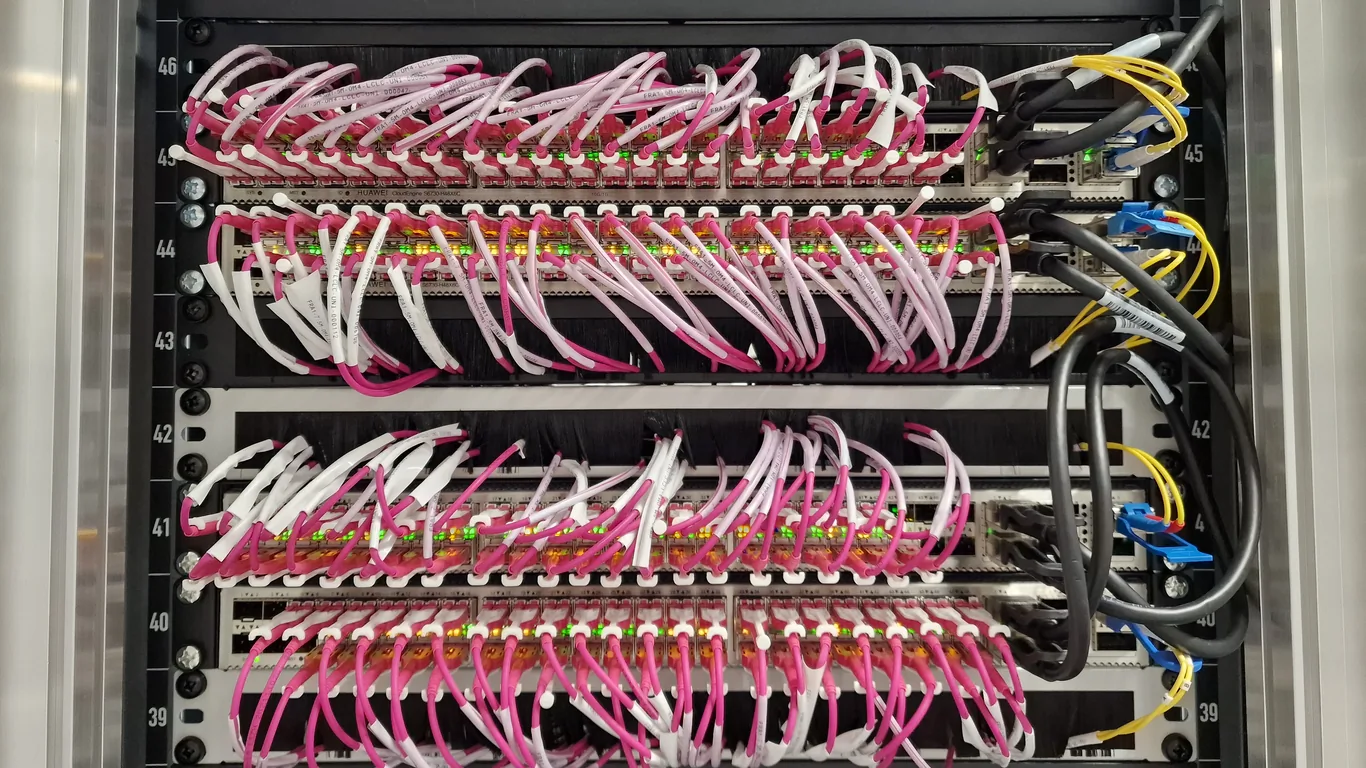
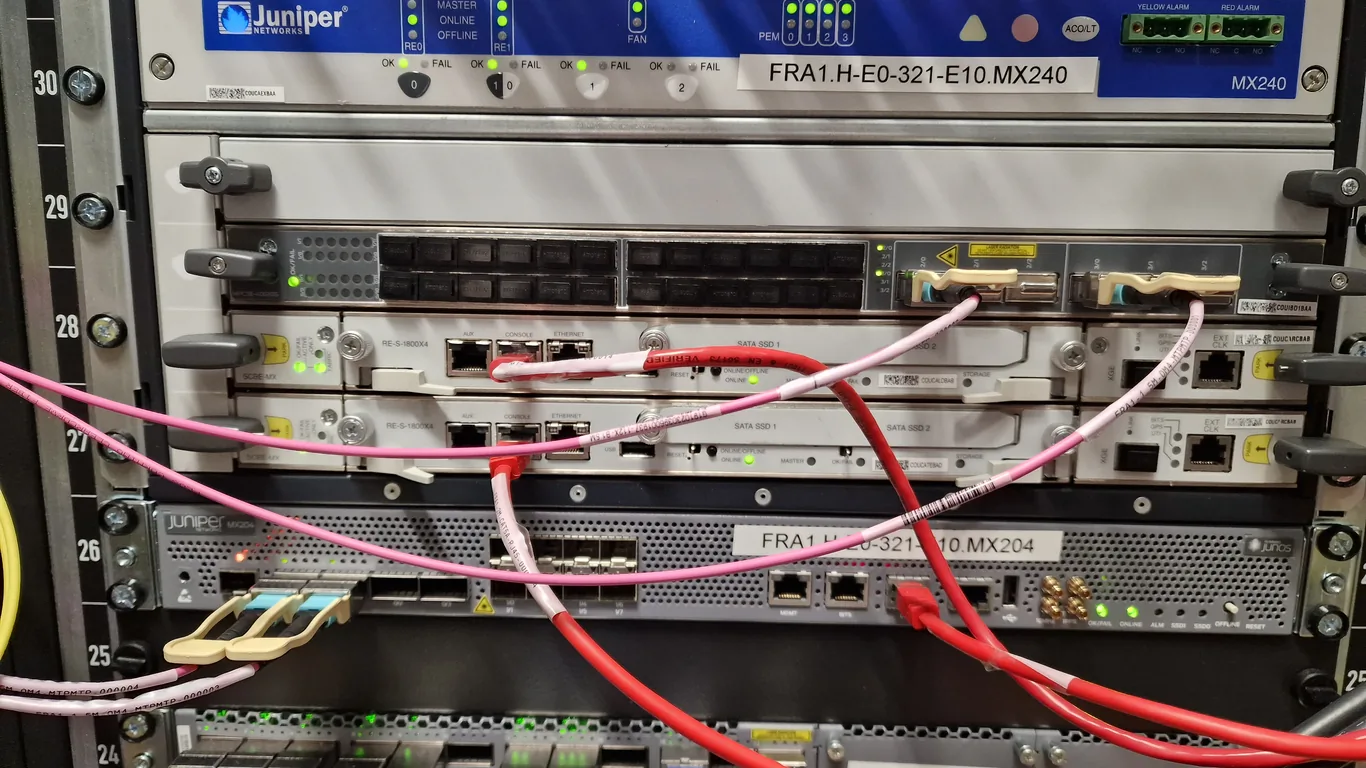
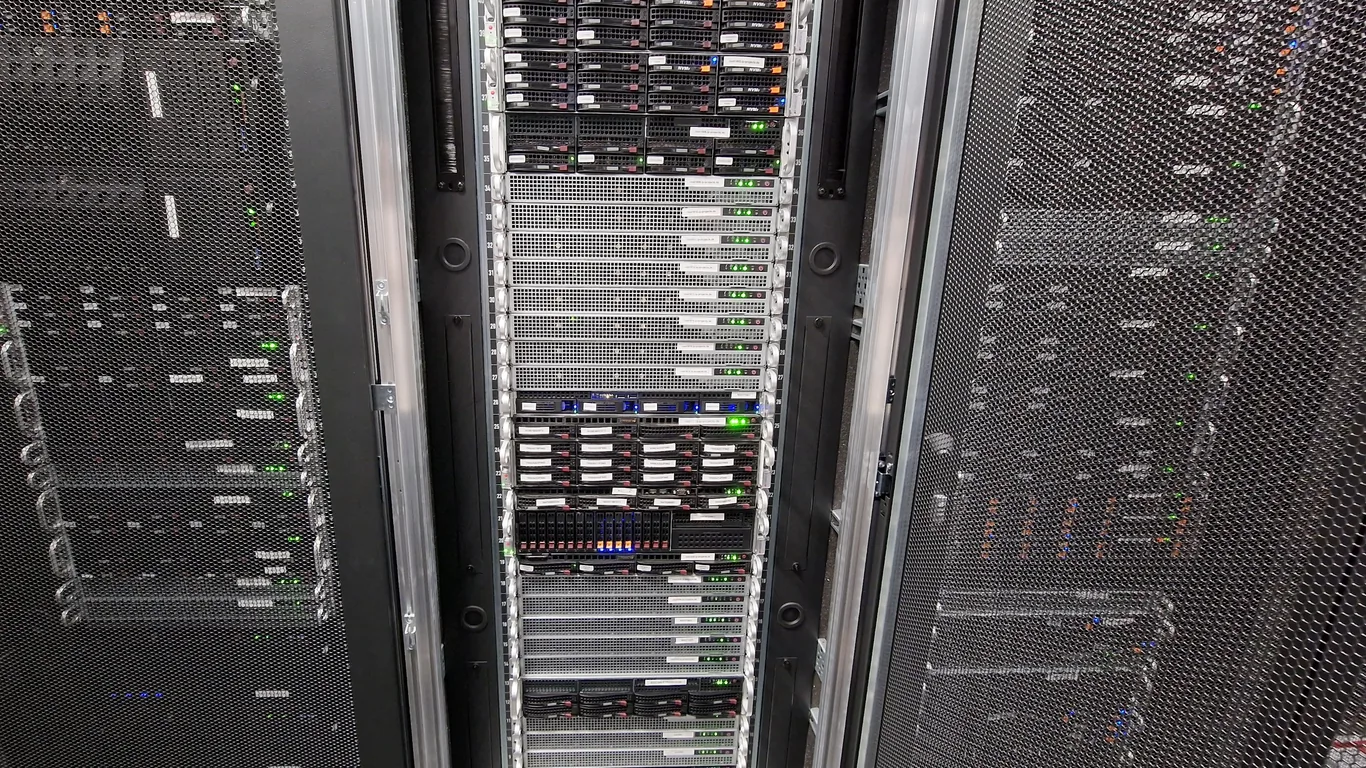
Easy vServer management: auto-installation, ISO mounts, IP/rDNS management, snapshots, backups, and much more!
The administration of our vServers is handled via our self-developed vServer management system. Installation, restarts, monitoring, IP management, and traffic analysis become effortless.
Through the individual dialogs, you always have direct access to the most important parameters and actions.
We offer all common operating systems for installation. Either as an automatic Cloud-Init installation. If we do not offer your desired operating system, ISO images can also be installed via VNC access.
Whether it's installation or troubleshooting. With VNC, you have direct access to your vServer at all times.
Snapshot and backup management is also simple and clear. This means you have everything under control, even if a problem arises.
Redundant core switch stacks for 10 Gigabit/s direct cabling - 80 Gigabit/s connection to routing stack - FRA1 location
Redundant routing stack consisting of technically different routers that are almost identical in terms of performance characteristics - Location FRA1
Server rack 0.8 x 1.2 meters with redundant top-of-rack switch stack and redundant 2-feed power supply - location FRA1
For more green IT
The carbon footprint of the Internet with its servers and data centers is growing incessantly. However, in addition to using energy-efficient hardware, we can also actively support nature: With every new rating - whether positive or negative - we therefore have 2 new trees planted.
Server Location Frankfurt am Main
Highest Hardware Redundancy
Fast Deployment
100% Green Power
Simple Server Management
KVM Virtualization
DDoS Protection
Upgrade Possible Anytime
Frequently asked questions
What is a Storage vServer?

Our Storage vServers are virtual servers with particularly large storage space, optimized for data storage, backups, media archives or memory-intensive applications. You receive full root rights and can use it like a normal Linux server. The main difference to our other vServers is that our Storage vServers use a very large local storage volume in the form of Enterprise HDDs.
What are vServers with a lot of disk space suitable for?

Our Storage vServers are particularly suitable for:
- Data- & Offsite-Backups
- Media storage (e.g. for Nextcloud, Plex, Jellyfin, Seafile)
- File Server, e.g. for restic, rsync and SFTP
- Long-term archiving of large amounts of data
- Monitoring, logging or backup targets (e.g. Zabbix, Prometheus)
- Large databases or repository servers that do not require disk performance
Which storage technology is used?

Your data is stored on a local ZFS RAID 10, consisting of at least 8 Enterprise hard disks, in order to achieve a good balance between performance and data security. We use enterprise hard disks from the manufacturer Toshiba, which are designed for 24/7 continuous operation. These are approved for workloads of up to 550 TB/year and are also efficient in terms of energy consumption. Our storage vServers only use local storage. The use of a shared file system - such as Ceph - has been dispensed with here in favor of disk performance.
Is data stored redundantly?

Thanks to the use of a ZFS RAID 10, the data within the local storage is distributed redundantly across at least 8 hard disks. A RAID 10 is a RAID 0 which extends over several RAID 1 disks. The failure of one disk does not lead to any data loss. Theoretically, several other hard disks can fail at the same time, but it depends on which arm of the RAID 10 they are located in. The advantages of a RAID 10 are
- High reliability - one disk per mirror pair can fail without data loss
- High read/write speed - through striping & parallel access
- Fast recovery - mirroring makes rebuilds significantly faster than with RAID 5/6, for example
- Very good ratio of performance & security - Ideal for productive systems with many I/O accesses
How can I access my data?

Since you as the customer have full access to the vServer, you are free to decide which file services you use on the Storage vServer and how you access the data. Common variants would be, for example:
- SSH / SCP / SFTP
- restic, rsync, WebDAV
- Mounts via NFS oder SMB/SMBv3
- Installation of own services such as Nextcloud, MinIO, Samba, Seafile, etc.
Which operating systems are available?

With all our Linux vServer products you have a free choice of operating system. You can either use our predefined Cloud-Init images for a simple, automatic installation of the Storage vServer, or you can mount your own ISO images. The ISO installer then makes it possible to install special storage operating systems, for example:
TrueNAS SCALE (Linux)
Based on Debian, ZFS file system with snapshots and replication, support for Docker and Kubernetes, with web interface and ActiveDirectory support.
TrueNAS CORE (FreeBSD)
Based on FreeBSD, can be used stably in KVM environments with the correct CPU flags, but without Docker support.
OpenMediaVault (OMV)
Based on Debian, resource-friendly, supports Ext4, Btrfs and ZFS (via plugin), Docker support and large community.
Rockstor
Baseirend on OpenSUSE Leap, lightweight/modular structure, Btrfs with snapshots and pools
Proxmox backup storage (PBS)
Deduplicating, incremental and encrypted, good integration in Proxmox VE, multiple datastores possible.
How performant are Storage vServers?

The focus of our Storage vServer products is on high storage capacity, not CPU or RAM performance. Since hard disks still offer the best price-performance ratio for large amounts of data, our Storage vServer offers also exclusively use hard disks. To prevent individual virtual machines from exclusively consuming the entire hard disk performance, the hard disk speed is limited via the KVM hypervisor of the Storage vServer host. These vServers are therefore primarily suitable for large data volumes with a low IO load.
Are there traffic limits?

Depending on the purpose of the Storage vServer, very high traffic volumes can naturally occur. We therefore generally offer our customers a fair use traffic policy. This means that we calculate with a traffic consumption of up to 50 TB per month. This only applies to traffic that leaves the IP-Projects data center / network. Therefore, if our storage vServers are used for backups of IP-Projects (v)servers, this traffic is not counted in our analyses. If the volume is exceeded, no costs will be charged immediately. However, our employees will contact you and work out a joint solution on how to deal with the increased traffic volume.
Can I expand the memory later?

Within the scope of our Storage vServer offers, it is possible to switch to the next larger Storage vServer offer at any time. If the volume of our 'Storage vServer XL' is not sufficient, it usually makes more sense to switch to a Storage Dedicated Server in terms of price / performance factor than an individual vServer offer with more volume. Our staff will be happy to advise you to find a suitable solution.
How are backups created from Storage vServers?

Due to the amount of data, a complete backup of all customer data on a Storage vServer host would take far more than 24 hours and would noticeably reduce the performance of all running vServers in the meantime, which is why we cannot offer automated daily inclusive backups for this product. As an alternative, we offer our Storage vServer customers the option of booking external backup storage. This is operated at one of our other locations and can be mounted as a folder within the virtual machine using SMBv3, for example, and then used for self-administration. The advantage of this approach is that you can decide for yourself when sufficient IO resources are available for a backup without disrupting your productive operations. This approach also provides you with applications such as restic or rsync, which are specially designed for incremental backups of large amounts of data.
Linux vServer operating systems
Linux Storage vServer Administration
Storage vServer administration options
Of course, basic vServer administration functions are available with all our vServer products. These include:
- starting / stopping / restarting
- (re)installation
- VNC remote access
- stats like utilization and traffic
Following features are available with each of our vServer offerings:
Storage vServer Backup Management
Compared to our SSD based vServer products, we unfortunately cannot offer a free backup option with our Storage vServer offerings. The offered capacities would require an equally equal backup storage, which is not possible for the monthly rental price. We therefore offer an optional backup of the Storage vServer for rent. Many of our customers also use our Storage vServers as backup servers, which in many cases does not require an additional data backup.
Therefore, if you are not using our Storage vServers for backups but for a cloud environment, we can offer you a data backup of the Storage vServer for a small extra charge.
Linux Storage vServer Operating System Installation
The installation of our Linux Storage vServer is possible as 1-click via our server management. Thereby all common Linux operating systems are available. If you still need a special Linux, you have the possibility of an ISO installation.
The ISO installation is then done with the help of a VNC console, which is directly integrated into our server management. An additional VNC client is not required to use this management function.
Permanent VNC Console
To ensure that you always have the ability to access the virtual machine regardless of the Linux Storage vServer operating system, a permanent VNC console is available through our vServer administration panel. Therefore, if you make any misconfigurations - for example on the network - you can use this VNC console to undo the misconfiguration without the need for our customer support or restoring a backup.
The VNC console can be called directly from the web interface. An additional VNC client is not required, which makes working with VNC much easier at this point.
IP and R-DNS Management
Of course you can view your IP addresses and set R-DNS / PTR entries via our Linux Storage vServer management. Setting R-DNS / PTR entries on an IP address is necessary to ensure smooth email traffic. Many e-mail servers on the Internet reject e-mails if no R-DNS / PTR entry is set for an IP address. Our name servers are also secured using DNSSEC to prevent manipulation of these entries by third parties. Likewise, all IP addresses that we provide to our customers are secured using RPKI.




